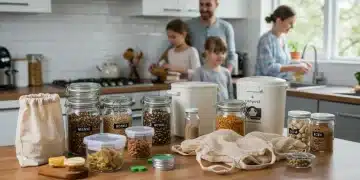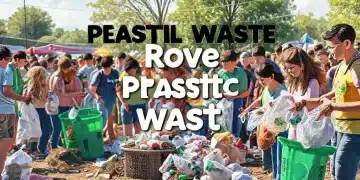Reduce Plastic Waste: 10 Simple Swaps for a Greener Life
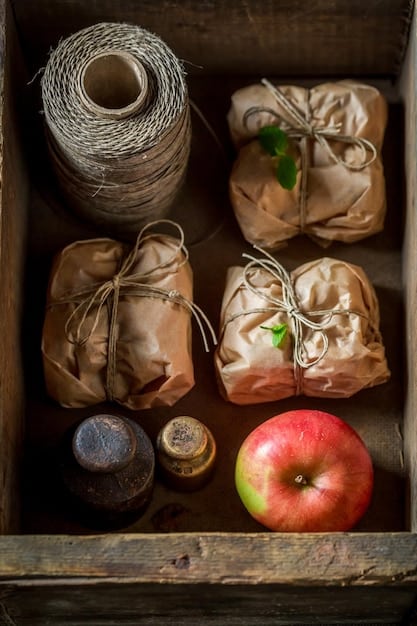
Reduce plastic waste significantly by adopting these 10 simple swaps, focusing on eliminating single-use plastics from your daily routines and embracing sustainable alternatives that benefit both your lifestyle and the environment.
Are you ready to ditch single-use plastics and embrace a more sustainable lifestyle? Learning how to reduce plastic waste is easier than you think, and these 10 simple swaps can help you make a big impact.
Easy Ways to Reduce Plastic Waste
Plastic pollution is a pressing environmental issue, but the good news is that we can all take action to reduce plastic waste. Small lifestyle changes can add up to a significant impact. Let’s explore some easy swaps to get you started.
This comprehensive guide will walk you through ten practical and achievable changes to minimize your reliance on single-use plastics. From your kitchen to your bathroom and beyond, these swaps are designed to integrate seamlessly into your daily routine while making a tangible difference in the fight against plastic pollution.
Why Reduce Plastic Waste?
Understanding the impact of plastic waste is the first step towards making a change. Plastics take hundreds of years to decompose, and single-use items contribute to overflowing landfills and ocean pollution.
The Impact of Single-Use Plastics
The convenience of single-use plastics comes at a significant environmental cost. By understanding the scope of the problem, we can better appreciate the importance of these simple swaps.
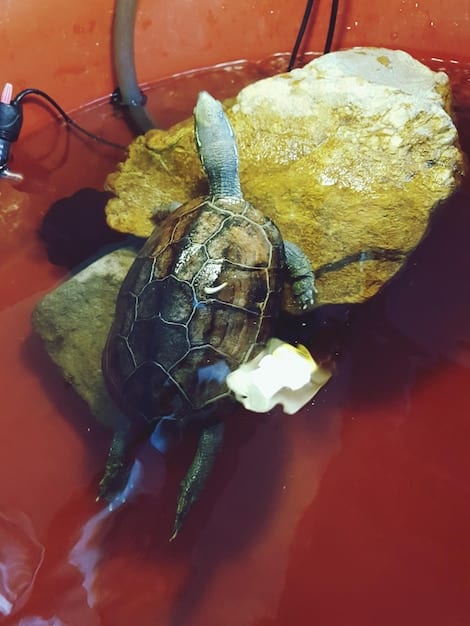
- Plastic bags contribute to habitat destruction and animal entanglement.
- Plastic bottles leach harmful chemicals into water sources.
- Microplastics contaminate soil and water, affecting the food chain.
By reducing your reliance on plastics you can help save the environment for future generations.
Swap #1: Reusable Shopping Bags
One of the easiest ways to reduce plastic waste is to switch to reusable shopping bags. Keep a stash of sturdy bags in your car and by the front door so you always have them on hand when you’re heading to the store.
Plastic shopping bags are a major source of pollution. They are lightweight and easily blown away, ending up in waterways and harming wildlife. Reusable bags offer a simple and effective solution.
Choosing the Right Reusable Bag
With so many options available, selecting the right reusable bag can make a big difference in your shopping experience. Consider these factors when making your choice:
- Durability: Look for bags made from sturdy materials like canvas or reinforced nylon.
- Size: Choose bags that are large enough to hold a substantial amount of groceries.
- Washability: Opt for bags that are easy to clean and maintain.
Swap #2: Say Goodbye to Plastic Water Bottles
Plastic water bottles are a significant contributor to plastic waste. Invest in a reusable water bottle and refill it throughout the day. This simple swap can save hundreds of plastic bottles from ending up in landfills each year.
Staying hydrated is essential, but relying on disposable water bottles is not sustainable. Reusable water bottles are convenient, eco-friendly, and can even save you money in the long run.
Benefits of Reusable Water Bottles
Switching to a reusable water bottle offers numerous benefits, both for you and the environment.
- Reduces plastic waste and pollution.
- Saves money on buying bottled water.
- Ensures you have access to clean drinking water wherever you go.
Swap #3: Ditch Plastic Straws
Plastic straws are often unnecessary and end up as pollution in our oceans. Simply say “no straw, please” when ordering drinks at restaurants and bars, or carry your own reusable straw.
Straws are small, but their impact on the environment is significant. By refusing single-use plastic straws, you can help protect marine life and reduce plastic waste.
Reusable Straw Options
If you enjoy using straws, there are plenty of reusable alternatives available.
Metal straws are durable and easy to clean. Bamboo straws are biodegradable and add a natural touch. Silicone straws are flexible and safe for children.
Swap #4: Eco-Friendly Food Storage
Replace plastic wrap and disposable containers with reusable food storage options. Beeswax wraps, glass containers, and silicone bags are great alternatives for storing leftovers and packing lunches.
Plastic food storage products contribute to plastic waste and can leach harmful chemicals into your food. Reusable options are safer, more sustainable, and often more durable.
Choosing Reusable Food Storage
The market offers a wide variety of reusable food storage solutions, making it easier than ever to ditch plastic wrap and disposable containers.
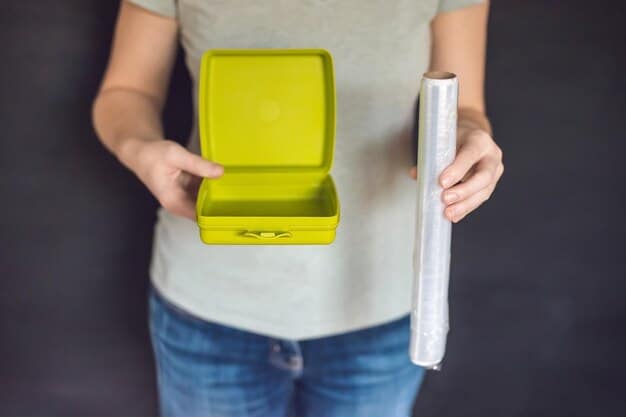
Glass containers are ideal for storing leftovers in the refrigerator. Beeswax wraps are perfect for wrapping fruits, vegetables, and sandwiches. Silicone bags are great for snacks and on-the-go meals.
Swap #5: Reusable Coffee Cups
If you’re a coffee lover, invest in a reusable coffee cup. Many coffee shops offer discounts to customers who bring their own cups, making this swap both eco-friendly and budget-friendly.
Disposable coffee cups are lined with plastic, making them difficult to recycle. By using a reusable cup, you can significantly reduce your contribution to plastic waste.
Benefits of Reusable Coffee Cups
Bringing your own coffee cup is a simple way to make a positive impact.
- Reduces waste from disposable cups.
- Saves money with discounts at coffee shops.
- Keeps your drink hot for longer.
Swap #6: Plastic-Free Toiletries
Many toiletries come in plastic packaging. Look for shampoo bars, package-free soap, and refillable containers to reduce plastic waste in your bathroom.
The bathroom is often a source of plastic waste. By making conscious choices, you can transform your routine into a more sustainable practice.
Finding Plastic-Free Alternatives
The market for plastic-free toiletries is growing, making it easier to find sustainable alternatives for your everyday needs.
Shampoo bars eliminate the need for plastic bottles. Refillable containers allow you to purchase products in bulk and reduce packaging waste. Bamboo toothbrushes are a biodegradable alternative to plastic toothbrushes.
Swap #7: Buy in Bulk
Purchasing food and household items in bulk can significantly reduce plastic waste. Look for stores that offer bulk bins and bring your own reusable containers to fill.
Buying in bulk reduces the amount of packaging waste associated with individual products. It also allows you to purchase only what you need, minimizing food waste.
Tips for Buying in Bulk
To make the most of bulk shopping, consider these tips.
- Bring your own reusable containers and bags.
- Store bulk items properly to maintain freshness.
- Plan your purchases to avoid overbuying.
Swap #8: Reusable Utensils
Carry a set of reusable utensils with you to avoid using disposable plastic cutlery when you’re eating on the go. Many kits come with a fork, spoon, knife, and chopsticks in a convenient carrying case.
Plastic cutlery is often used once and then discarded, contributing to landfill waste. Reusable utensils are a simple and effective way to reduce plastic waste wherever you are.
Choosing Reusable Utensil Sets
When selecting a reusable utensil set, look for durable and lightweight options that are easy to clean.
Stainless steel utensils are durable and dishwasher safe. Bamboo utensils are lightweight and biodegradable. Carrying cases help keep your utensils clean and organized.
Swap #9: Compost Food Scraps
Composting food scraps reduces waste and enriches your garden soil. Many communities offer composting programs, or you can start your own compost bin at home.
Food waste contributes to landfill waste and releases methane gas, a potent greenhouse gas. Composting diverts food scraps from landfills and turns them into valuable resources.
Getting Started with Composting
Composting can be a simple and rewarding way to reduce waste and improve your garden.
Choose a composting method that suits your space and lifestyle. Compost food scraps, yard waste, and paper products. Turn your compost regularly to aerate it and speed up decomposition.
Swap #10: Support Businesses Committed to Sustainability
Choose to shop at businesses that prioritize sustainability and take steps to reduce plastic waste in their operations. This sends a message to other businesses that consumers value environmental responsibility.
Supporting sustainable businesses encourages more companies to adopt eco-friendly practices and reduce plastic waste.
How to Identify Sustainable Businesses
Look for certifications and labels that indicate a company’s commitment to sustainability.
Check for companies that use recycled packaging, offer refill programs, and support environmental initiatives. Read reviews and research a company’s environmental policies before making a purchase.
| Key Swap | Brief Description |
|---|---|
| 🛍️ Reusable Bags | Use sturdy, washable bags for shopping. |
| 🥤 Reusable Bottles | Carry a bottle and refill throughout the day. |
| 🍽️ Eco-Friendly Storage | Switch to beeswax wraps and glass containers. |
| ☕ Reusable Cups | Bring your own cup to coffee shops. |
Frequently Asked Questions
▼
Reducing plastic waste is vital because plastic pollution harms wildlife, contaminates ecosystems, and takes hundreds of years to decompose. Reducing plastic waste helps save the environment.
▼
The easiest ways involve swapping single-use items for reusable alternatives like shopping bags, water bottles, and food containers. These choices are great ways to reduce plastic waste.
▼
Lead by example, sharing your sustainable practices via social media. Educate friends and family about the impact of plastic and suggest simple swaps that they can incorporate.
▼
While seemingly better, biodegradable plastics often require specific conditions to decompose, which aren’t always met in landfills. Reducing plastic waste at the source is still the superior method.
▼
Ensure it’s properly recycled. Check local guidelines, rinse containers, and separate plastics by their recycling number. Some recycling initiatives may accept certain niche plastics.
Conclusion
By making these ten simple swaps, you can significantly reduce plastic waste and contribute to a healthier planet. Every small change counts, so start today and inspire others to join the movement towards a more sustainable future.

